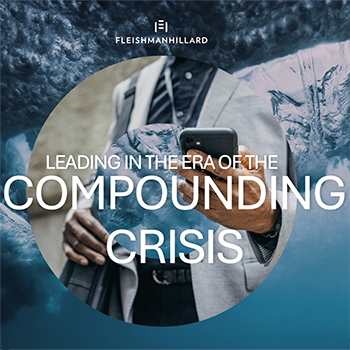FH Shares: Age in PR

Ian Williams, Director
Let me start by saying that I am aware I have all the privilege – I am a white, middle-class, man. I acknowledge the advantages that those things have given me in my life.
But here’s the thing.
I am over 50.
For all you Millennials and Gen Zs, that makes me Gen X.
To be honest, I’d been working client-side for a while, and I wasn’t expecting to move back to the agency world. But then the opportunity to work at FleishmanHillard came along, and I jumped at the chance.
And I absolutely love it.
But I know that I am one of the very few people in the 50+ age bracket agency-side. And it’s a slightly weird feeling. In fact, I sometimes feel out of place.
When we talk about Diversity, Equality, and Inclusion we often think about gender and sexuality, people of colour, people with disabilities (hidden or otherwise) and people from different social-economic backgrounds.
But what about age?
As with all forms of discrimination, if we exclude a group of people from the workforce we miss out on the perspective and experience that those people can bring. And it’s worth remembering that around a third of the UK population is over 50 (and that proportion is actually growing).
And yet, according to the FT, firms are more likely to turn their backs on older workers. And since the pandemic, the UK has reportedly ‘lost’ almost 500,000 people over 50 from the workforce, according to the ONS. People over 50 who lose their jobs are also three times more likely to be long-term unemployed.
I’ve been working in communications for 30 years. I’ve sold in a lot of stories and got some great coverage. Equally, I’ve had plenty of campaigns that crashed and burned. Pitches won and lost. Difficult clients. I am scarred by them all, but I hope I’ve learned from them. I’ve worked in-house and in consultancy, through both boom times and recession, and have learned about how to survive both. I’ve delivered social media campaigns, worked with influencers, can shoot and edit videos, and build a webpage in HTML.
What do I add to a team? Well, I specialise in financial service clients so it’s useful to have actually had home, life, medical and car insurance (and claimed on some of them). I started out renting, but was able to buy a house – and move a few times. I have tried fixed and tracker mortgages, and even remember when mortgage rates were 14.5%! I’ve dabbled with saving and investing, used loans and credit cards, written a Will and done a few tax returns over the years. In short, I have real-lived experiences of many things our clients do.
Beyond this, I know what it means to try to juggle work with bringing up kids. Together we’ve survived health and educational crises, redundancy, and friends and colleagues taken too soon. There have been wonderful times too: holidays, weddings, graduations, and the daily pleasure of walks with the dog. I helped grow a consultancy from 13 to 110 people and won a few awards along the way. Optimism and common sense have got me though.
My perspective is that of somebody who learnt to do communications before email, mobile phones and the internet. A lot has changed, and I’ve gained new skills along the way, but what has stayed the same is the need to build and nurture relationships – with clients, media, and colleagues alike. Back then, building relationships often happened over lunch or drinks: today’s challenge is doing so in the hybrid world.
What makes communications endlessly fascinating – and why I love coming to work every day – is how we’ve flexed and adapted to change. This ranges from how media is created and consumed, the rise of social media, and consumers’ expectations of how leaders and businesses should behave and communicate. We are constantly having to reinvent the way we work.
We must have more ethnic diversity, people with disabilities and those from different religious and social economic backgrounds and sexual and gender orientation at every level in communications. But there should be room for those of us who are older too. Even so, there are still questions that we need to answer: what does the career path for those of us in our 50s in communications consultancy look like? How do we progress? And how long will we be able (allowed?) to keep working?
Ian Williams, Director
Find Out More
-
Leading in the era of the compounding crisis
October 2, 2025
-
AI in the Newsroom
August 26, 2025


